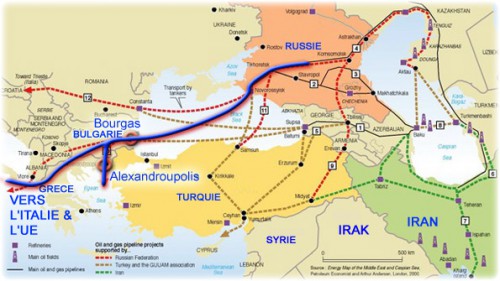lundi, 16 juin 2014
Why Is the U.S. Afraid of South Stream?

Why Is the U.S. Afraid of South Stream?
|
Ex: http://www.strategic-culture.org |
|
The West is continuing to twist the arms of Russia's partners in building the South Stream gas pipeline. Hot on the heels of the Bulgarian government, Serbia has announced that work will be suspended. Both countries cited the position of the European Commission. But EU energy commissioner Gunther Oettinger refuses to discuss the construction of South Stream in the format of a consultation with Russia, the project's main participant…
While Bulgarian Prime Minister Plamen Oresharski explained the suspension of work on the South Stream project with a request from the European Commission and the need for «additional consultations with Brussels», Serbian Deputy Prime Minister and Energy Minister Zorana Mihajlovic attempted to blame her country’s historical rival in the Balkan region - Sofia. However, she did not refrain from political speculations either. «Until the negotiations between Bulgaria and Brussels and between the EU and Russia are finished, we are going to stand idle. Or until Russia changes its position. In any case, the result of both scenarios is that work in our country is being delayed». But the Serbian minister did not mention that «Russia's position» with regard to the South Stream project was set down back in early 2008 as part of Russian-Serbian intergovernmental agreements on energy cooperation. The obligations of the parties with regard to South Stream were the main topic of those documents, which were later ratified by the parliament of Serbia and confirmed by all subsequent national governments. Besides the intergovernmental agreement on energy cooperation, an agreement for Gazprom Neft to purchase a controlling interest in Serbia's oil monopoly Naftna Industrija Srbije (NIS) for 400 million euros and 500 million euros in investment commitments was under discussion. It is not surprising that Serbian Prime Minister Aleksandar Vucic had to correct his cabinet member; he stated that the Serbian government has not made any decisions to suspend the implementation of the South Stream project. As for the Russian-Bulgarian agreement on Bulgaria's participation in the South Stream project and the creation of a joint enterprise to this end, that agreement was ratified by the Bulgarian parliament in July 2008. And in May 2009 in Moscow, gas companies from Russia, Italy, Bulgaria, Serbia and Greece signed a summation document on the construction of the South Stream pipeline. In August 2009 this document was supplemented with a protocol signed by Turkish Prime Minister Recep Tayyip Erdogan on the transit of the South Stream pipeline through Turkish territorial waters. Not long after that, the French company Electricite de France joined the number of project participants. Such is the true canvas of events which testifies to the groundlessness of references to some kind of incompatibility between the South Stream project and the national interests of Bulgaria and Serbia or international legal practices which supposedly has now come to light. And even the European Commission was well aware of the provisions of the 2008 agreements. We must look elsewhere for the reasons for the unexpected anti-Russian speeches sounding from Sofia and echoing in Belgrade. The fact that Prime Minister Plamen Oresharski made his statement on South Stream after a meeting with three high-ranking representatives of the U.S., headed by Senator John McCain, did not escape the attention of the Bulgarian public. McCain did not even bother to conceal the demands the American emissaries made of Sofia and other partners of Russia: «We understand that there are some issues concerning the South Stream pipeline project...obviously we want as little Russian involvement as possible». According to available information, Washington has decided to strike a new blow to South Stream, in whose construction German and French companies are also participating, after receiving alarming news from Baku. A source in the Azerbaijani company SOCAR indicated that the French company Total and the German company E.ON might sell their shares in the project for building the Trans-Adriatic Pipeline (TAP): «The German concern E.ON has already announced its intentions to sell its stake in the TAP project. France's Total also announced intentions to sell its participation in the project». Considering that TAP was intended to replace the failed Nabucco project, which the European Union and the U.S. actively lobbied for, Washington and Brussels' panic is understandable. There is one more thing which is making the Americans nervous. This is connected with a change in the situation on the world energy market. The recently published report of the International Energy Agency, World Energy Investment Outlook 2014, predicts a slump in the «shale revolution» in the U.S., and, most importantly, an increase in the dependence of the United States on gas imports at a time when Saudi Arabia and Iran's export capabilities have decreased. In this situation, Washington decided that it was urgently necessary to take control of the main routes for transporting energy resources connecting Russia and Europe. And Washington sees blackmailing Russia, for which Brussels, Sofia and Belgrade were tools, as a completely suitable means of serving its own interests. |
00:05 Publié dans Actualité, Affaires européennes, Géopolitique | Lien permanent | Commentaires (0) | Tags : politique internationale, russie, ukraine, mer noire, géopolitique, hydrocarbures, south stream, gaz, gazoducs, europe, affaires européennes |  |
|  del.icio.us |
del.icio.us |  |
|  Digg |
Digg | ![]() Facebook
Facebook



Les commentaires sont fermés.